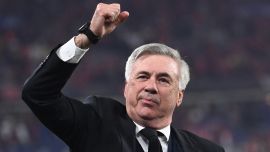Driving by his neighbourhood stadium, Paulo Torres takes his eyes off the road long enough to look the familiar venue over in disbelief.
"What? Messi is going to play here?"
Like many Brazilians, the Rio de Janeiro ride-hailing app driver has not been paying much attention to the Copa América, even though their normally football-mad country is standing in as emergency host of the pandemic-battered South American championships.
Neymar and the Seleçao are vying to win Brazil's second straight continental title, and global superstars including Lionel Messi, Luis Suárez and Arturo Vidal are all slated to play.
But the Copa América has largely failed to captivate Brazil, overshadowed by the desperate rush to replace original co-hosts Argentina and Colombia, sponsor withdrawals, political polarisation and Covid-19.
Torres, 39, is a case in point.
A football fan, he has lived his whole life in the neighbourhood where the Nilton Santos Olympic Stadium sits, but did not know Messi's Argentina were making their tournament debut there against Vidal's Chile Monday
"I didn't even know there was a match, let alone that Messi was playing here. Caramba! That's crazy, right?" he said.
Not that it would have made much difference.
With matches being held in empty stadiums because of Covid-19 – still raging in Latin America – Brazilians are watching them on TV just like everyone else, if at all.
Covid blues
The majority of Brazilians – 54 percent – are against holding the tournament in their country, according to an online poll by market research firm Offerwise.
Three sponsors – Mastercard, beer giant Ambev and alcoholic beverage company Diageo – pulled their branding from the tournament.
It has been a rough ride for this edition of the Copa America, the world's oldest international football tournament.
Originally scheduled for 2020, it was delayed 12 months by the pandemic.
It nearly had to be called off again when Argentina and Colombia fell through as hosts because of a surge of Covid-19 in the former and violent anti-government protests in the latter.
President Jair Bolsonaro gave his blessing two weeks before last Sunday's opening match for Brazil to stand in.
But the move is hugely controversial, given that Brazil is also reeling from Covid-19, which has claimed nearly half a million lives in the country, second only to the United States.
The decision has been swept up in politics in a Brazil deeply divided over Bolsonaro, who has fought lockdowns, pushed ineffective medications and refused offers of vaccines against Covid-19.
Covid-19 has meanwhile arrived for the Copa as feared.
Three days into the month-long tournament, Brazil's Health Ministry reported 27 cases among players and staff from the 10 participating teams, and 26 among service providers contracted for the four-city event.
Brazil played their opening match against a Covid-decimated Venezuela forced to call up 15 emergency replacements.
Unsurprisingly, the defending champions won 3-0.
'Not the same'
The contrast with the 2014 World Cup and even the 2019 Copa América in Brazil is stark.
In Brasilia, where the opening match was played, it was difficult to find any fans at all.
Henrique Chavari, 38, was one of the few who had left home to cheer on Brazil. He watched the match in a bar.
"They're playing the Euro 2020 right now with fans in the stadiums, because Europe is way ahead of us on vaccination," he said.
"Here, we have to watch the Copa América on TV. You can't even compare it. It's just not the same without that human warmth."
Neighborhoods in Rio and São Paulo that normally erupt in cheers when the home team score were conspicuously quiet Sunday.
The kick-off match lost out to a musical reality show in TV ratings.
Part of the issue may be disenchantment with the Brazilian national team.
The five-time world champions' current lineup does not command the reverence of yesteryear.
"Romario, Ronaldo, Ronaldinho, that generation of players got us so excited, they made us want to watch them play. Today it's a bunch of players who have some talent but whose main interest is making money," said Torres.
"I always used to take a break from work to watch the Seleçao," he said from behind the wheel.
"Now I'm not interested."
related news
by Rodrigo Almonacid, AFP























Comments